“The hardest part was seeing seriously injured children in the Okhmatdyt Children’s Hospital and murdered children in Bucha. I will also never forget the first interview in my life – with the mother of a seven-year-old boy who was hit by five bullets. A woman with a bullet wound to the head then survived, but her son did not. She cried for thirty minutes, and I cried for thirty minutes…”
Oleksandr Kostiuchenko, a Ukrainian translator for the journalistic team of the British edition of the Daily Mail, a team that has been covering its actions since the beginning of the russian-Ukrainian war, says that he has seen killed servicemen, severed limbs, not to mention shot pets. “But children are a completely different dimension for me,” he adds without hiding his emotions.
- The smell of something burning could be felt several kilometers away from Chasiv Yar
Translator, fixer, and “second cameraman” Oleksandr Kostiuchenko and field producer Dariya Bahlai are two Ukrainians who work side by side with a British journalist, foreign correspondent of the Daily Mail with 25 years of experience, laureate, and nominee of many prestigious professional awards Richard Pendlebury and Daily Mail cameraman Jamie Wiseman. Richard Pendlebury and Jamie Wiseman‘s reporting from hot spots around the world, from Iraq to Afghanistan, has always been characterized by depth and humanity. British media people created a series of films, Mail: Frontline, about the war in Ukraine, which since last summer, has gained more than 12 million views on YouTube.
The Ukrainian members of the team say that their work is not just translation or organization of filming. This is a real immersion in the maelstrom of events, risky trips to the front and a constant search for stories that will be able to convey the truth about the war to the international community.
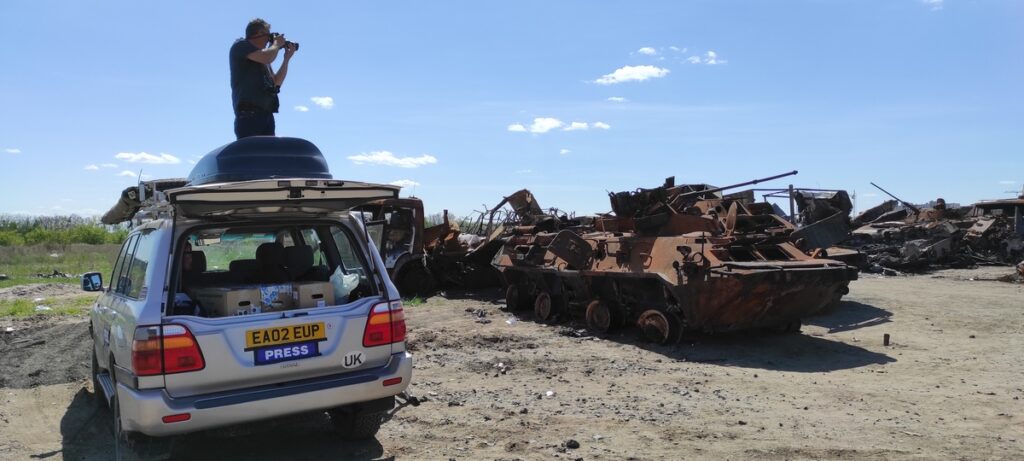
“They have visited Chasiv Yar several times. The first one was relatively safe – then the front line was still in Bakhmut,” Oleksandr recalls. “It was quite scary because I wasn’t used to it: I translated and literally jumped from the sound of artillery. Although it was our artillery, no one canceled reflexes… The remaining two trips were already this year. The first time, we had drone direction finders, so-called “candies,” and the second time, the “direction finder” was only my eyes. The trip was, as they say, lucky because the russians are very active in using FPV drones.”
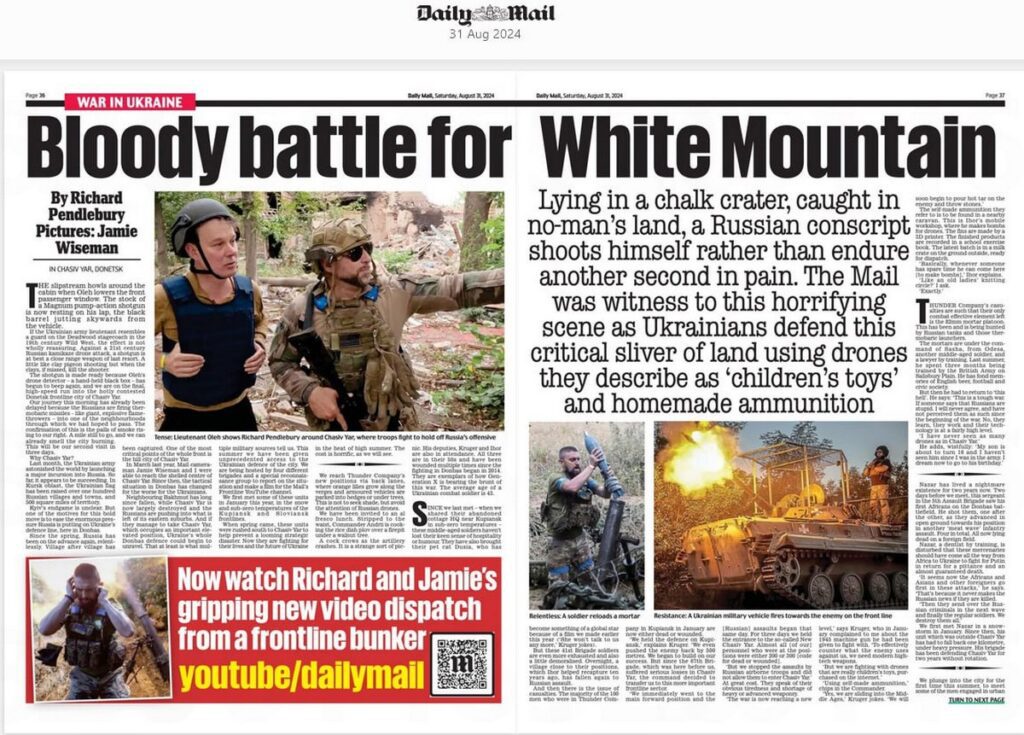
The smell of something burning could be felt a few kilometers away from Chasiv Yar: that day, part of the city was covered with a Solntsepyok MLRS. Such hits burn bricks. Journalists had to work under constant artillery fire.
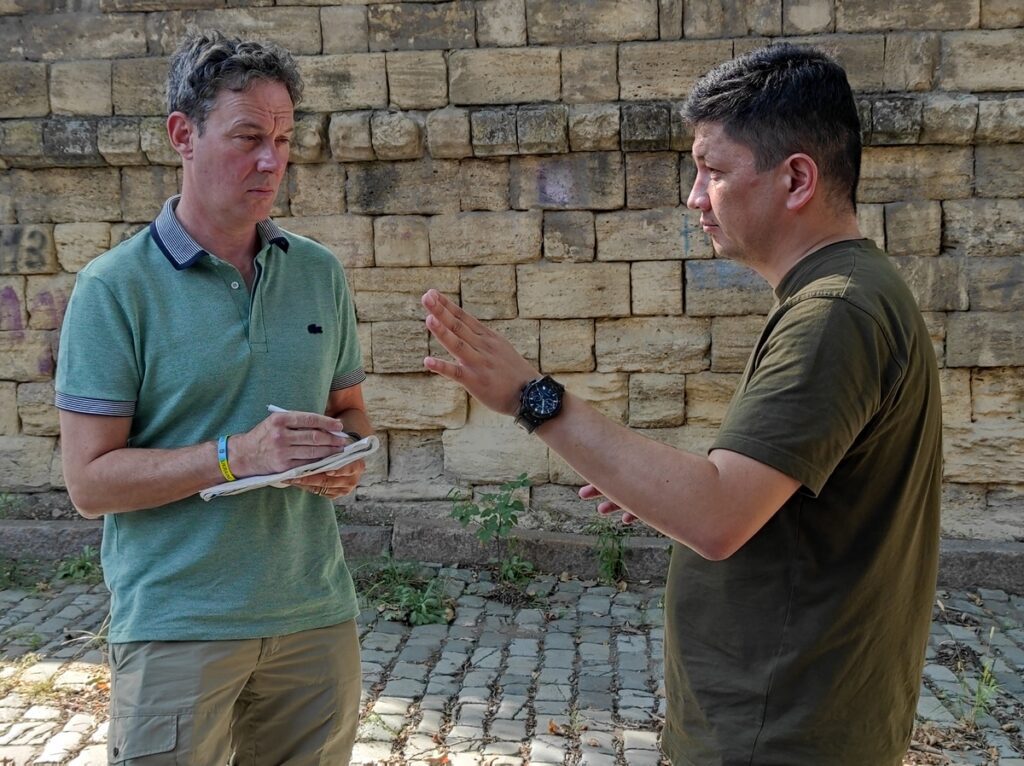
According to Dariya Bahlai, the risk is felt in a completely different way when you are at work than, for example, during the shelling of the city when you are sitting at home.
“While working, you are focused on many things,” she says. “After all, you always keep in mind the importance of your actions here and now. This does not allow you to panic. In addition, our team tries to avoid unnecessary dangers; we never go to do an interview under fire just to be under fire. We only take risks when there is no other way to do things. Taking into account the value of what you do, you act like a professional, also realizing that you can always lean on a friend’s shoulder. And Richard and Jamie, who, by the way, have been collaborating for decades, created an extremely well-coordinated and cool team around them. I observed this ability to create teams in other Western journalists.”
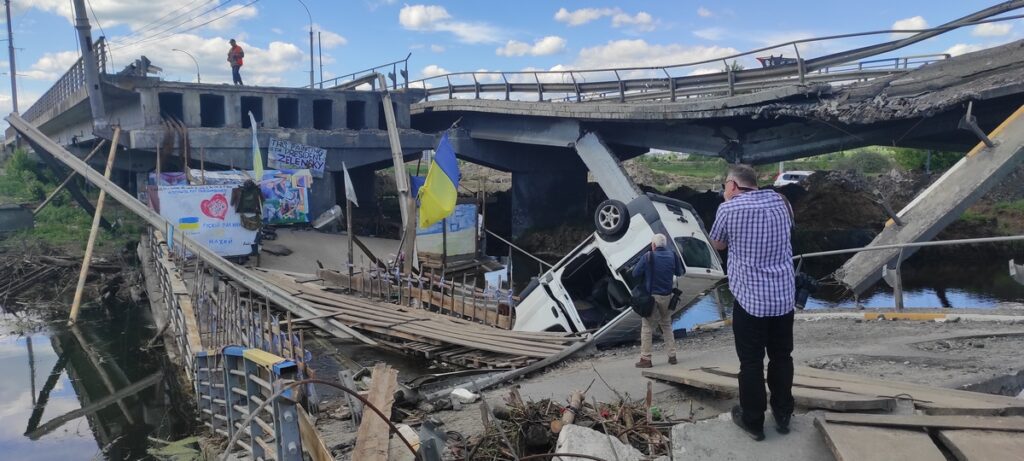
At the same time, there is a constant sense of risk, which does not go without a trace.
“Every time after a trip, I need a day or two to come to my senses. I immediately recognized the sound of guided bombs, which I had first heard in a video about Azovstal when it sounded in Pokrovsk. Frankly speaking, I understand the military, who are indignant at those in the rear who “feel too relaxed,” says Oleksandr Kostiuchenko.
Oleksandr is from Kyiv, while Dariya is from Kramatorsk, where her relatives still live. Therefore, trips to the Donetsk Region are always associated with additional emotions for her.
“I really remember the first time I came to Kramatorsk with Richard and Jamie. I was very happy to show them my hometown, the streets I used to walk along as a child… During that trip, I was very proud of the defenders of the city. Kramatorsk has taken on a lot of attacks, and it has become a home for many volunteers and soldiers because here you can rest, take a shower, and eat properly,” Dariya recalls.
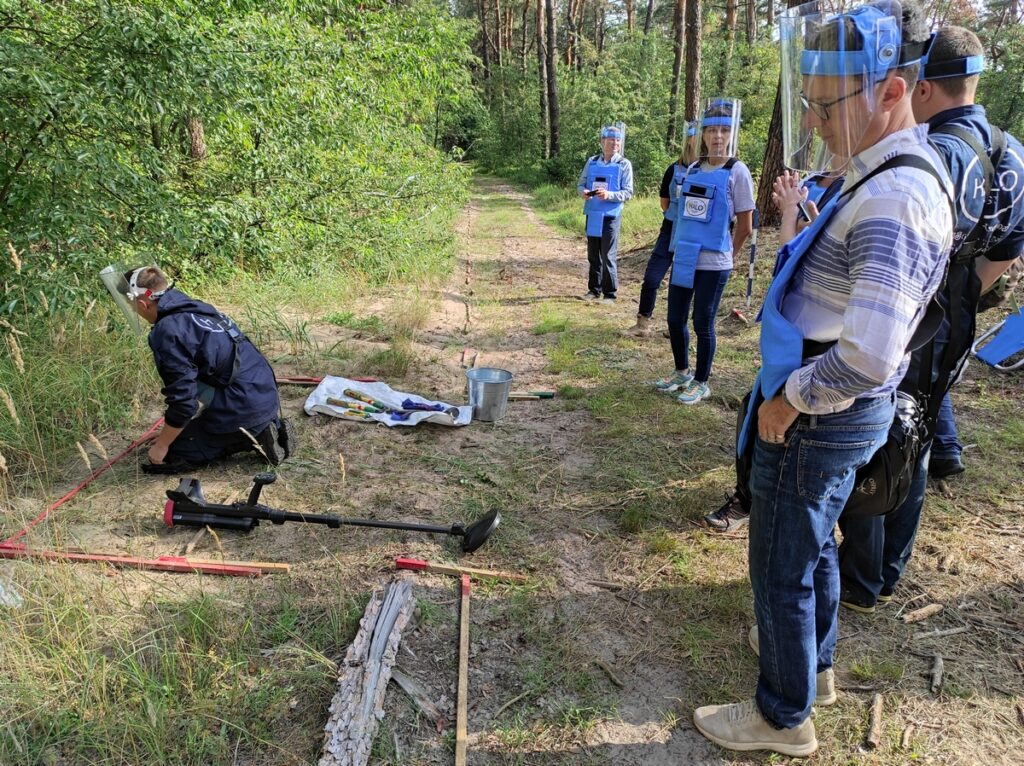
- From translators and volunteers – to fixers
Oleksandr Kostiuchenko, who translated mostly technical, legal, and business texts before the war, has been working with the Daily Mail since March 6, 2022. He remembers his first day at work as the beginning of a new phase in his life.
“I sent my family to western Ukraine, to the Chernivtsi Region. We were waiting for the evacuation train when a girl approached us and asked if we wanted to talk to British journalists,” Oleksandr says.
He did not mind giving a comment in good English, and this chance meeting was the beginning of his cooperation with the Daily Mail. Oleksandr not only translates, but also helps in the organization of filming, communicates with the military, finds interesting locations for reports, and even reviews the draft material for unexpected blunders, imperceptible to foreigners.
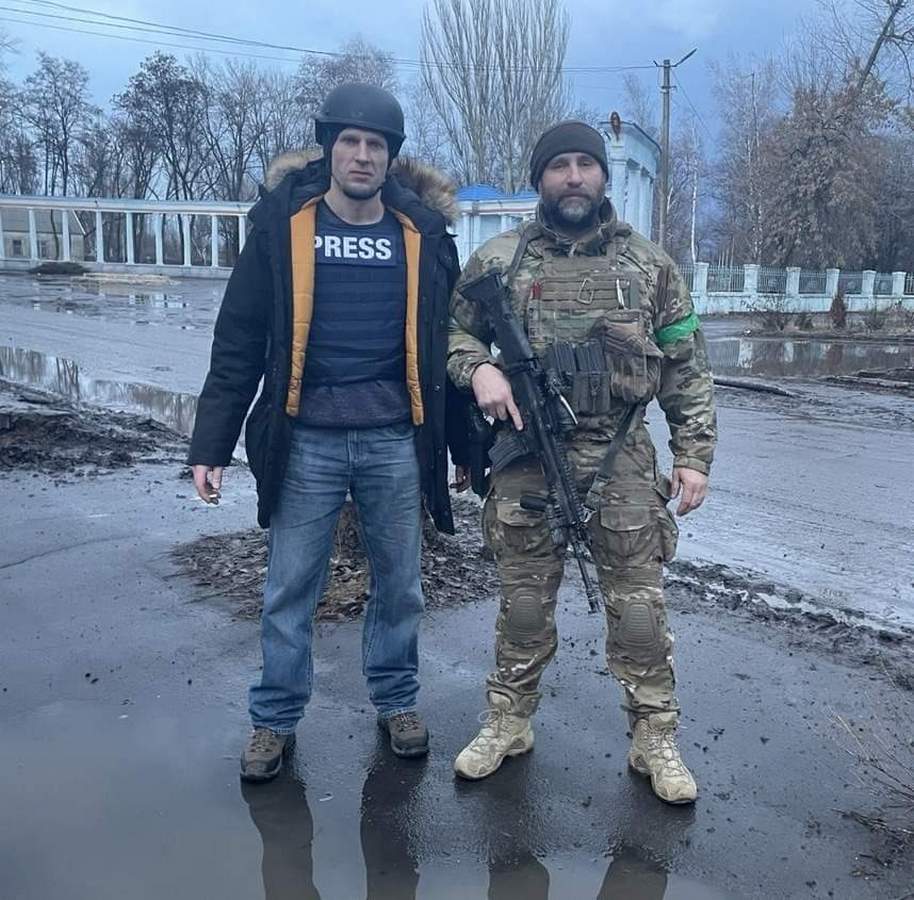
His colleague, Dariya Bahlai, has a different story. She is the director of the charitable foundation Mercy and Health, which takes care of the physical and mental health of Ukrainians and delivers humanitarian aid to the frontline territories. It was through this activity that she met the Daily Mail team.
“Mutual acquaintances, donors, and various non-governmental organizations from Britain, with whom we work as volunteers, once advised the Daily Mail to inquire about the work of our foundation,” says Dariya. This is how her cooperation with British journalists began.
Dariya performs the role of a field producer. She organizes filming, communicates with press services of military units, and conducts preliminary interviews. There is a procedure for organizing the work of a foreign journalistic group.
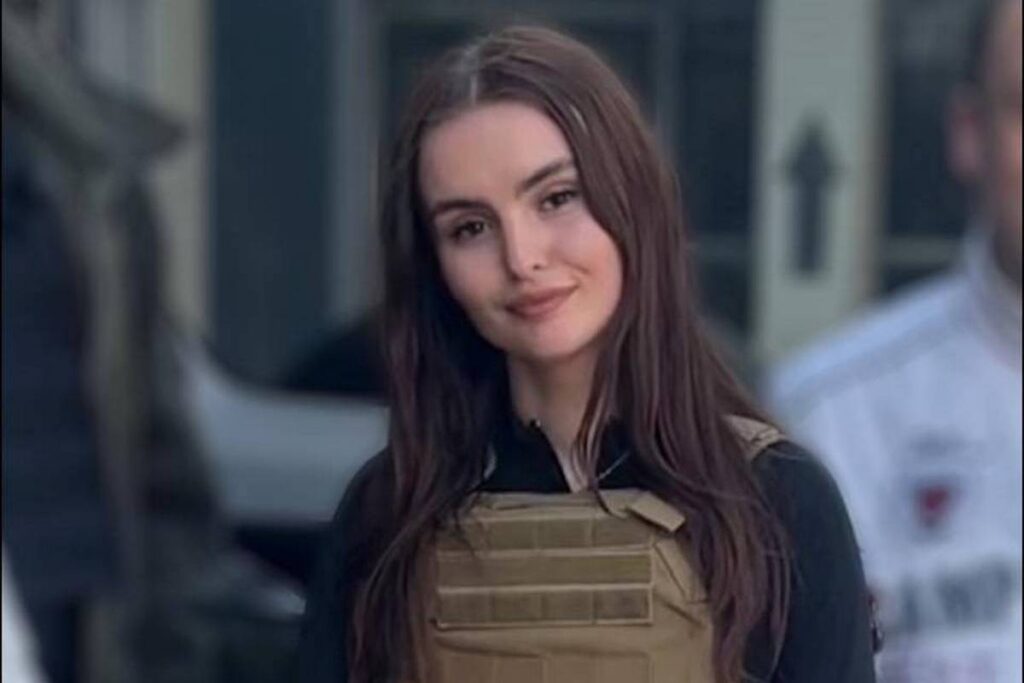
- Military journalism as an experience of a lifetime
Both Ukrainian members of the Daily Mail team note the professionalism and dedication of their British colleagues.
“Richard and Jamie are great professionals. Given the history they have in their professional careers, we, Ukrainians, should learn from them, not the other way around,” says Dariya. “For them, military journalism is a lifelong experience.”
Oleksandr and Dariya emphasize the special approach of the Daily Mail to coverage of events in Ukraine.
“One of the main strengths of Daily Mail stories, their content, is that they create very personalized interviews, essays and stories. All their films are primarily about interesting people, heroes,” says Dariya.
Dariya Bahlai says that Richard and Jamie, cooperating with her foundation Mercy and Health, met the military serviceman Oleh Leheza, the hero of many stories of theirs: about drones, about the Donetsk village of Niu York, about Chasiv Yar.
“During each trip, the British colleagues set a clear goal for themselves; they are interested in this or that perspective of the war,” says Dariya. “Recently, they made a material about the guy Nazar, who was a dentist before the war, and now he is a medic of the reconnaissance group. Another hero is the fighter Makar, who was a police officer before the war. Judging by the comments that the British leave under the posts of Richard and Jamie, all this “touches” them very much. If for Ukrainians it is obvious that our army is a segment of our society, then for foreigners it is a real shock that completely peaceful people, until recently lawyers, doctors, and cooks, stand up for the defense of their country and turn into military personnel – perhaps the best in the world.”
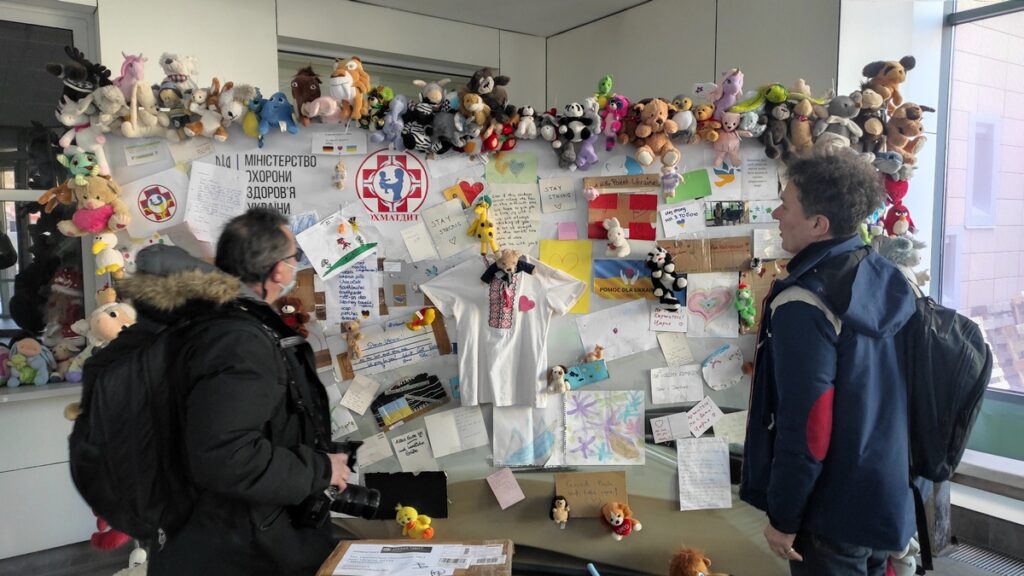
Working with foreign journalists became for Ukrainian colleagues not only a professional challenge, but also an opportunity to learn something new. Dariya notes that a characteristic feature of the personalities of Richard Pendlebury and Jamie Wiseman is “readiness for everything.”
“They come to another country, having an absolute language barrier. They improvise and find some incredible combinations of possibilities in order to create a full-fledged plot and get the most materials,” says Dariya with enthusiasm. “They found an interpreter at the train station while filming a story; they went to film a charity fund and realized that this could become an opportunity for them; they stay awake at night, waiting for a certain military man to call them and offer a ride, they are ready to come to for three weeks, realizing that there will be problems with agreements, they understand that in the conditions of war, it is necessary to keep quiet about something in order to save someone’s life… This readiness for improvisation and the talent for improvisation are fascinating.”
She is especially impressed by the ethical approach of her British colleagues to the journalist’s work.
“We had a lot of discussions with them about journalistic ethics. And despite the fact that, after all, Britain is associated with some mannerism, they are ready to go beyond the limits, they are ready to go beyond the norms and boundaries. They are always looking for ways to hook their viewer or print audience because they understand that the value of their materials is very high,” says the fixer. “They are here, they are in place, and they, like no one else, can convey the truth about Ukraine to the world. The war in Ukraine hurts them, and therefore, instead of “standing above the conflict,” they are quite complimentary to us and write very kindly about Ukraine.”
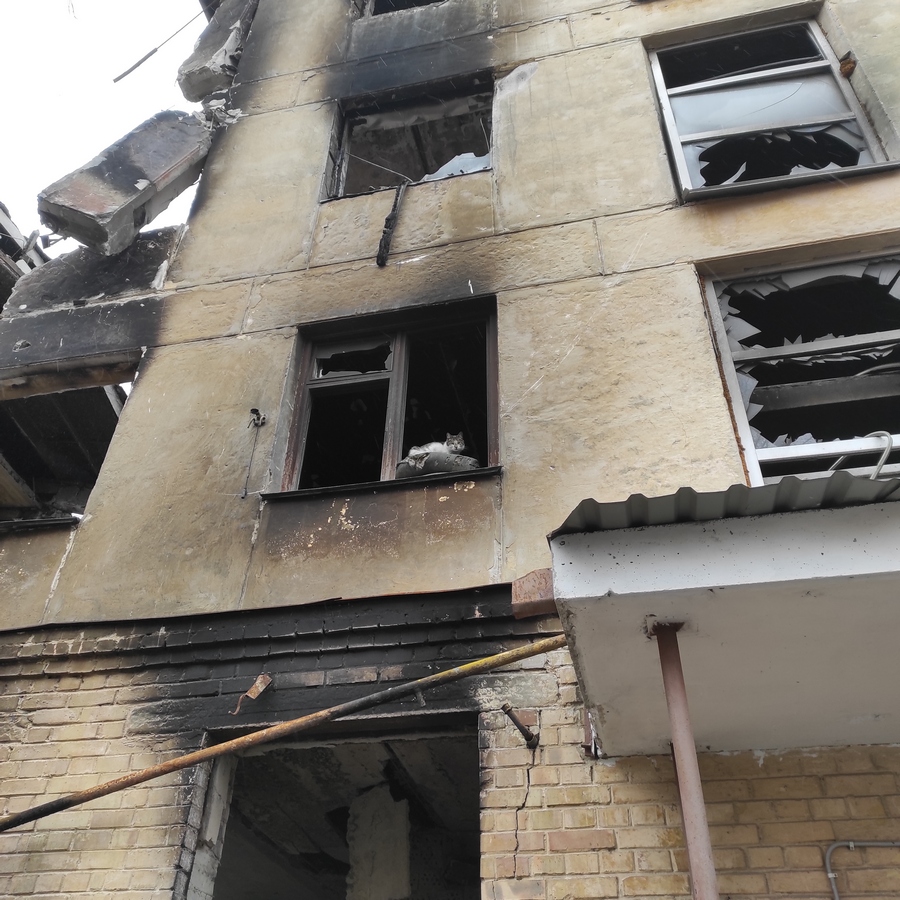
Oleksandr Kostiuchenko believes that Richard Pendlebury could become an example for many in terms of his humanity.
“Recently, we visited one of the stabilization points near the front line. There was no need to translate – the doctor communicated in good English… Literally, immediately after we left, Richard was already talking on the phone with British doctors he knew about how to transfer an ultrasound diagnostic device to this checkpoint,” said Oleksandr.
“The courage and resilience of Ukrainian journalists should be an inspiration to everyone in our profession”
Richard Pendlebury and Jamie Wiseman themselves speak highly of their Ukrainian colleagues. During a recent meeting with the President of the National Union of Journalists of Ukraine (NUJU), Sergiy Tomilenko, they learned, in particular, about the enormous daily work that journalists of local publications perform in the front-line territories.
“Your bravery and resilience should be an inspiration to everyone in our profession and a reminder of the importance of what we do,” said Richard Pendlebury. And Jamie Wiseman, after getting to know the two international photography exhibitions presented at the NUJU office, added: “Wedding photographers have become war correspondents, social observers have turned into front-line reporters.”
“British colleagues were especially impressed by the stories of editors and journalists of front-line local newspapers,” said Sergiy Tomilenko. “I told about the NUJU initiative to revive and support such publications, that often in Orikhiv, Lyman, Huliaipole, Zolochiv or Kherson, local newspapers are the only available source of information for people.”
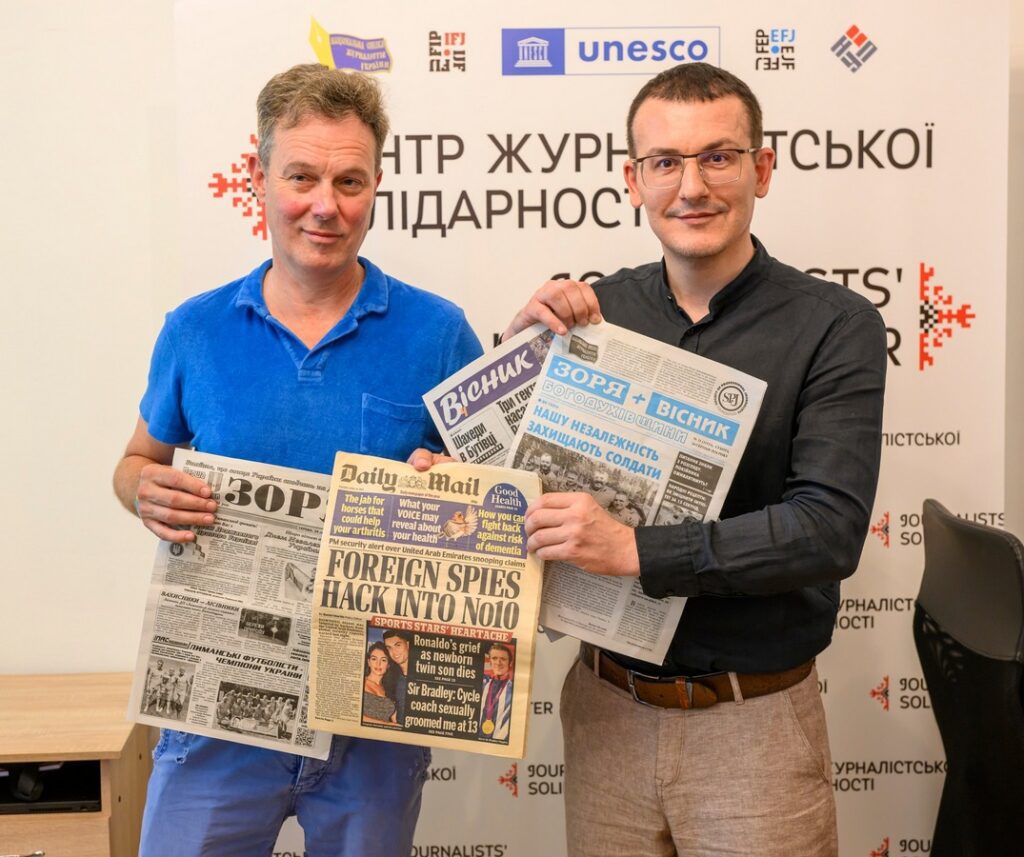
During the meeting, Richard Pendlebury also recognized the Ukrainian members of his team. Speaking about Dariya Bahlai, he said that she is smart and fearless and has all the qualities to become a first-class director or journalist. Oleksandr Kostiuchenko was described by the British as a key member of the team, devoted to his work.
* * *
Both Oleksandr and Dariya plan to continue their important work. Oleksandr also decided to join the NUJU in order to participate even more actively in the professional life of the country’s journalistic community. His application will be considered in the near future when the colleague returns from a series of important business trips.
“Oleksander Kostiuchenko has been working with us as a translator, fixer, and second operator since March 2022,” Richard Pendlebury wrote in his recommendation letter to the NUJU. “Dariya Bahlai from Kramatorsk was a student journalist in Kyiv when the full-scale invasion began and now works with us on the front lines as a field producer. Both are a great source of pride for our profession and Ukraine.”
Dariya still combines work with studies at the Institute of Journalism of Taras Shevchenko National University of Kyiv.
“It is very difficult, of course, but it is possible because the teachers understand the current conditions; they know what I do,” she says. “I am grateful that, thanks to this understanding, they make concessions regarding my activity during classes, but I am trying, and I am interested in it. And the experience you gain by working directly in the field is certainly very valuable.
Maksym Stepanov, NUJU Information Service

 THE NATIONAL UNION OF
JOURNALISTS OF UKRAINE
THE NATIONAL UNION OF
JOURNALISTS OF UKRAINE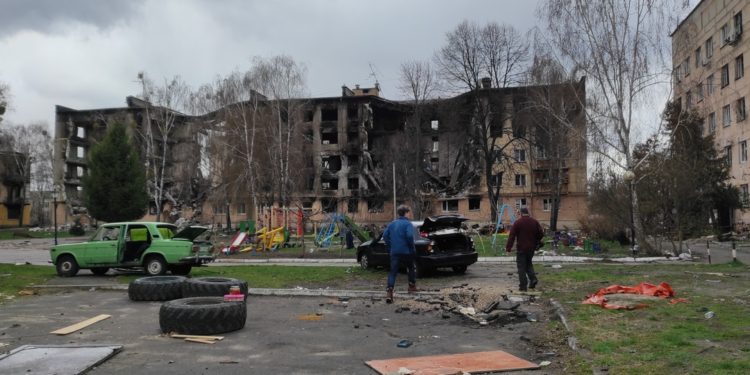
















Discussion about this post